Common Council drops the Pledge; what it tells us
Analysis and Commentary by Robert Lynch; January 28, 2024
The lazy answer: Our big sisters downtown just followed in the Enfield Town Board’s progressive footsteps, Ithaca’s Common Council marching wayward—and leftward—a full four years after we did. But to say that is to pay disrespect to us in Enfield. I was there for what happened to our town in 2020. Indeed, I was in the thick of it. I remember. I can compare. It was different.

Last Wednesday night, January 24th, at a torturously boring work session that wasn’t ever intended to touch the hotplate of controversy, the all-too-young, all-too-unseasoned Ithaca Common Council removed the Pledge of Allegiance from its meeting agendas. Not one of the ten persons on the legislative body that purportedly governs our county seat provided the Pledge a decent defense.
The time-honored recitation was sent to the landfill just like one of those many Collegetown houses the wrecking claw now pulls apart. Tradition matters no longer to those in City Hall. Nor does patriotism. Maybe generations Millennial and younger never learn patriotism in school. Maybe they no longer practice it in life.
Reporters tell us Common Council has ignored the Pledge for years. The agenda’s command was skipped over “both because of its symbolism, but also to save time,” Alderperson Ducson Nguyen gave as his retired colleague Donna Fleming’s excuse for skipping the recitation as past meetings began.
Now, first, let’s address the time factor: I replayed a recent opening of the Tompkins County Legislature. They still say the Pledge over there. I brought a stopwatch. Legislators honored Old Glory in just twelve short seconds. On the other hand, at meetings of Common Council, discussions typically drag on for three or four hours. Precious time gets frittered away by repetitive public whinings and self-serving political preening. No, Fleming’s efficiency rationale fails the time test. “Symbolism” is what truly mattered to her, and now what matters to just about everyone else down there.
Common Council plainly hadn’t intended to make the Pledge’s demise the most newsworthy nugget of the night. It only did so because The Ithaca Voice covered the meeting. Ithaca’s new Mayor, Robert Cantelmo, seemed annoyed that the topic had even come up. But amid a procedural discussion of agendas, meeting nights, and the City Manager’s newfound power to filter the advice of department heads, Alderperson Patrick Kuehl, a Cornell student, woke the sleeping dog that others would have let lie.
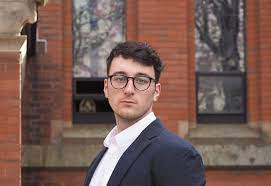
“On the order of business, I really like the Pledge of Allegiance,” Kuehl said, thereby providing the Pledge of Allegiance its only—and shortest-lived—endorsement of the night. “I might be the only one here,” Kuehl apologetically continued, “but I like when that was an order of business. Everywhere in the United States does that. I think that it’s kind of unifying across all states and localities.”
Well, maybe every other locality except, of course, Enfield. Enfield’s Town Board excised the Pledge of Allegiance from its formatted agendas in January 2020. Following public outcry, the Board partially walked back its decision a month or two later. Enfield Town Board attendees can still recite the Pledge, but now only under privilege-of-the-floor.
As Alderperson Kuehl provided the Pledge of Allegiance his tepid support January 24th, Alderperson Phoebe Brown, attending via Zoom, was seen shaking her head as though she’d just tasted lye.
“I am not in favor of bringing back the Pledge of Allegiance,” Brown emphatically responded. Minutes later, Brown, African-American, explained her reason.
“I remember as a child doing the Pledge of Allegiance,” Brown recalled. “I remember crying to it; feeling this strange urge to do it. However, as I got older, it (the Pledge) didn’t give my people liberty and justice for all.”
Now, stop one minute and contemplate Phoebe Brown’s chosen words. I am certain she cannot be the only one in her racial community to speak them or to think them. To Alderperson Brown, the nation to which our flag symbolizes is not truly her nation, not a nation that embraces and respects and draws its resilience from persons of all colors and all beliefs. Her perception, my readers, is wrongly placed.
No matter how much blood was shed in the Civil War; no matter how many attempts have been made and successes achieved over the decades and centuries to infuse racial justice into this nation and to elevate minority voices into the national debate, Phoebe Brown will not be satisfied. Alderperson Brown does not see this nation as her own. She does not see it as a nation worthy of the respect that pledging to its flag symbolizes. This is troubling. This is sad. And this is dangerous. Phoebe Brown listens to the wrong voices. Alderperson Brown views this country through a far different lens than I do. I wish she did not. We must build a bridge between her America and mine.
But if not a Pledge of Allegiance to the flag, then what? Common Council wrestled with that question… until it gave up.
“I would think sort of a ‘pledge to liberty and justice for all’ I sort of like,” Alderperson Clyde Lederman said in offering Patrick Kuehl a little bit of help, though not much. And with Lederman’s few words, the Pledge of Allegiance pretty much died for the rest of the night.
First Ward Alderperson Kayla Matos wanted no part of the Pledge. Neither did anyone else. Even Kuehl retreated from his earlier support.
“I am not married to the Pledge of Allegiance, by any means,” Kuehl clarified as the discussion (sort of) progressed. “I really like the idea of like having something that grounds us… I think it really brings everybody together to a focused space.”
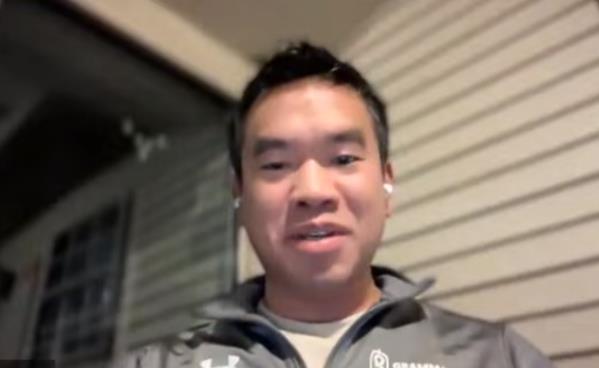
Kuehl said he’d be satisfied with Lederman’s suggestion that Council substitute a statement affirming Native American land rights, words Lederman claimed begin “all meetings at Cornell,” including those of the Faculty Senate. It’s “a nice and perhaps more culturally-sensitive way to begin our meetings,” Lederman suggested.
But, please notice how blithely everyone that night cast off the patriotic import of what they’d chosen to discard. The only thing Common Council really searched for was a formalized bookend to start its meeting. Substance devolved into whatever the prevailing activist mentality demanded for the moment.
And what predictably took hold was a most conflicted wandering through the weeds of political correctness, a journey where each and every footstep tripped over an unwanted invasive species deserving rhetorical Roundup. One could easily have written the script for a lame episode of Portlandia.
“At LACS (Lehman Alternative Community School) we balanced this by having both a Pledge of Allegiance and an Earth Pledge in sequence,” Alderperson Pierre Saint-Perez, a proud LACS graduate, told Council. Kuehl said he liked Saint-Perez’s idea. “I think that’s great,” Kuehl said. (So much for any prior support he’d given the Stars and Stripes.)
“A moment of meditation to ground us” was Kris Haines-Sharp’s suggestion. She wanted no part of the traditional Pledge.
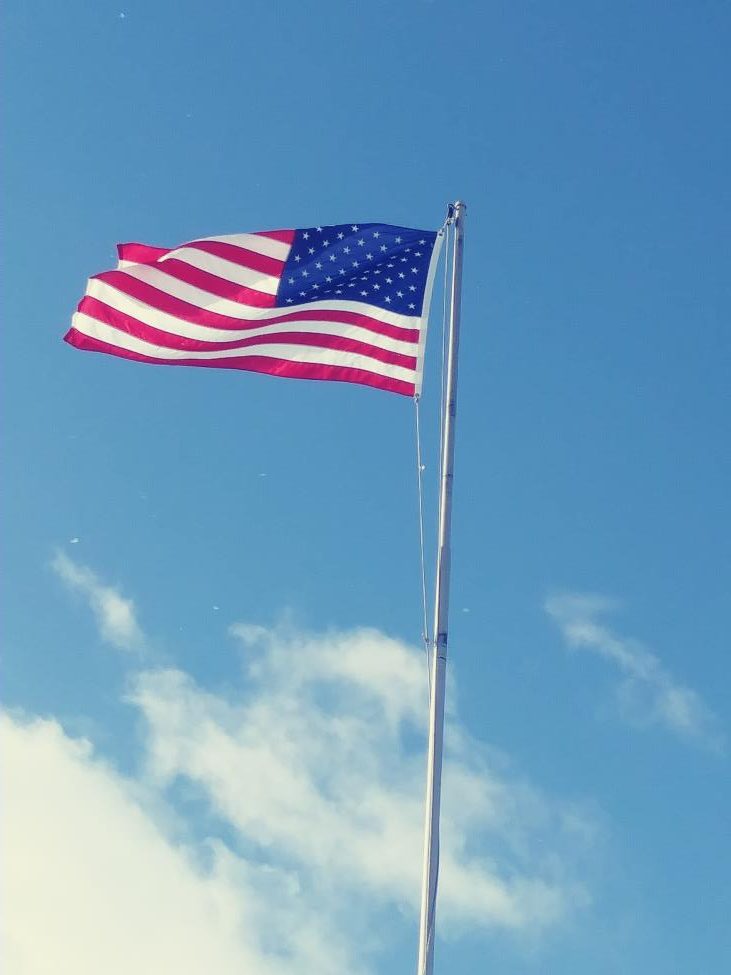
“I’d like a moment of reflection,” David Shapiro offered. “But I love all of it; so however people want to think of it in their own moment of silence, it all makes sense to me.”
But Lederman’s idea of a Native American land rights tribute became the favorite among some—though not all.
“I don’t think it is our position to do the Gayogoho:no’ Pledge if we’re not pledging back some land,” Phoebe Brown insisted. “I’d rather be giving them their land back than saying a pledge of theirs.”
Brown preferred a moment of silence. Colleague Tiffany Kumar, like Kuehl, a student, found silence insufficient.
“I think we’ve spoken before in Council about how moments of silence can often be performative,” Kumar observed. “And I do kind of want to bring back up the idea of a land acknowledgement,” she said “although it is not nearly enough to reckon with our history here on this land with the Gayogoho:no’ people.
Kumar quickly added, in predictable P.C. fashion, “I do think that if we want to have some sort of centering statement to the meeting, (Council’s acknowledging Native American land rights is) a great way to not only recognize who the land belongs to, but also raise awareness about the crucially important issue of returning land to them.”
“If that’s not performative, I don’t know what is,” Brown fired back. “We’re honoring the land that they cannot even have back. Now that’s performative! A moment of silence you can use it as you like, because it’s your moment.”
Let’s leave until another day, and another essay, challenging the hypocrisy and gutlessness of Tiffany Kumar, Phoebe Brown and her like-minded advocates. They give up not their own land to correct a perceived social injustice. They give back the land of an elusive, never-identified somebody-else. Enough said for now.
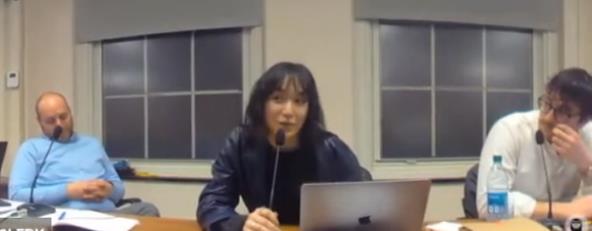
“Moments of silence can often be performative.” Alderperson Tiffany Kumar, flanked by colleagues David Shapiro and Patrick Kuehl, January 24th.
The short-lived, buried-amidst-a-heap-of-nothingness Common Council Pledge of Allegiance debate ran out of steam fast. Ducson Nguyen ended it with a predictable default remedy.
“I don’t need any preamble to our meetings,” Nguyen put forth. “I’m happy to jump into business and start the work of the evening.”
And so it will be; silence; nothing more. Mayor Robert Cantelmo, who’d grown increasingly impatient with his lawmakers’ side-trip into symbolic posturing, was eager to move on. “Absent a consensus on an item,” Cantelmo concluded, Common Council will delete the Pledge from its meetings “as we have done for the last many years.” Discussion ended… unless it resurfaces at some future meeting.
Yet, back to the central point here, Enfield handled the Pledge of Allegiance differently. In Enfield, the deletion was not relegated to some parliamentary footnote in a meeting surrounded by blah. The Pledge was not dismissed as an irrelevant ritual long-ignored in the past and not likely to be revived in the future. And never did Enfield Board members agonize so exhaustively over finding some fitting replacement.
At this writer’s first meeting as Councilperson, the Enfield Town Board stripped the Pledge of Allegiance from its agendas, yet did so only with a fight. Then-Councilperson, now Town Supervisor Stephanie Redmond moved first to delete “under God” from the Pledge’s wording. When Supervisor Beth McGee thought total elimination the better option, the Town Board voted 4-1 for total removal. Mine was the only vote cast to keep tradition—and patriotism—in place.
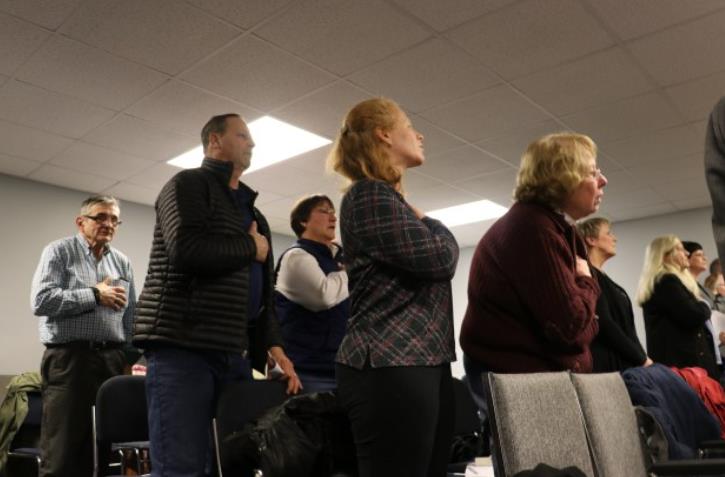
A firestorm of controversy followed weeks later. News articles got written. Residents came to meetings. Each year since, as agendas are organized in January, I’ve politely moved to reinstate the Pledge of Allegiance to its rightful place at the agenda’s top. Each time, no one seconds my motion. We move on. Under a compromise Enfield’s objectors insisted we add, you can still recite the Pledge of Allegiance at our meetings, but only if you ask to do so first.
Ithaca is different. No doubt, few will seek to recite the Pledge of Allegiance at future Common Council sessions. Old Glory’s respectful words already died through inattention there years ago. In Enfield, the Pledge still gets recited at most meetings, even if this Councilperson is the only person in the room to request it. I believe that pledging to our symbol of American democracy still matters. I have good justification.
Despite its many blemishes, inequities, and pressure points, I believe that our republic remains the best on this Earth. “Liberty and justice,” that some may fault as remaining far from perfect, are only as strong as we, ourselves, choose to make them. And if we sense our liberty or justice is crumbling away, it only means we must work harder toward their preservation or enhancement. Our system of laws and freedoms provides us that vehicle. Our flag is that vehicle’s symbol.
Here is the problem: Most now on Ithaca’s Common Council take America for granted. Many of their like-minded liberals do as well. For some, the Cold War is something they’ve only read about in textbooks; 9/11 happened when many were just kids. These critics dwell on our nation’s imperfections, rather than celebrate its strengths. For those like Alderpersons Brown, Matos, Nguyen, and even Kuehl, pledging to American liberty, heritage and opportunity isn’t worth their time to say it; not worth twelve seconds at a meeting.
As just a few on Common Council realized that night, convening a public meeting that lacks a ceremonial preamble somehow leaves one feeling naked. But it matters not just that you choose to say something, but also that you say something that matters. Those on Common Council last Wednesday night failed to grasp the distinction. Sadly, many of us in Enfield have failed to grasp it as well… and have for four years. Yes, there are some comparisons that fit.
###

